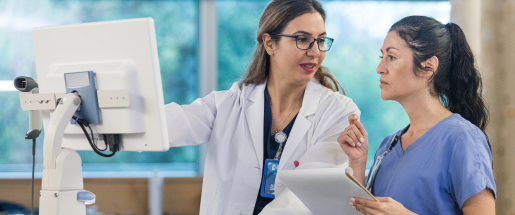Research and innovation with Horizon Europe
What is Horizon Europe?
Horizon Europe is the European Union's (EU) framework programme for research and innovation, with a budget of €95.5 billion (over $100 billion).
It addresses climate change, contributes to achieving the United Nations Sustainable Development Goals (SDGs), boosts competitiveness and economic growth, and optimises the impact of investment.
The programme develops talent, facilitates collaboration and reinforces the impact of research and innovation for public policy development, while addressing global challenges. It thus supports the creation and improvement of the dissemination of excellent knowledge and technologies.
Horizon Europe is structured around three pillars: Excellent Science, Global Challenges and European Industrial Competitiveness, An Innovative Europe. These pillars are translated into concrete actions, such as the European Research Council, the European Institute of Innovation and Technology, or the Marie Skłodowska-Curie Actions (MSCA).
International cooperation is a world-class research and innovation engine. Horizon Europe is one of the main tools for implementing the European Union Strategy for International Cooperation in Research and Innovation.
Marie Skłodowska-Curie Actions (MSCA)

Vacancies for predoctoral and postdoctoral researchers
If you are a researcher, MSCA gives you the possibility to train and develop your career in the European academy and outside it (in companies, hospitals, public institutions).
There are no nationality or age limits. Depending on the level - postdoctoral or predoctoral - the person must have a doctoral degree or have defended their doctoral thesis successfully, or not, respectively. You must not have pursued your main activity in the host country for more than 12 months in the 36 months prior to the application deadline.
The list of vacancies, updated on a daily basis, sets out all the requirements for the post. You apply directly to the institution or project of your choice.
In most cases, the host organization will hire you for a period of approximately 2 or 3 years.
MSCA grants provide a salary, mobility expenses, research and training costs, as well as management and indirect project costs.
Consult the list of offers and the information.

Postdoctoral projects
Postdoctoral Projects are prestigious scholarships, recognized globally for the training and research of people who already have a doctoral diploma. Its objectives are promoting excellence in training and research; support post-doctoral researchers to boost their career, develop their creative and innovative skills and potential, train and work under the supervision of leading researchers in their sector; supporting organisations to attract international talent.
Proposals are always collaborative: between the requester, the supervisor and the host entity. Research areas include chemistry, physics, social sciences and humanities, information sciences and engineering, environmental sciences and geosciences, mathematics, economics, etc.
Projects last between 1 and 2 for European Projects and between 1 and 3 years for Global Projects, with the option of 6 months for research stay in a non-academic organisation.
Panamanian researchers who are already residing in Europe for a minimum of 5 years can carry out their European Project in another country of the European Union or an associated country, or a Global Project with 1-2 years in Latin America and the Caribbean and another year in the EU or associated country.
Organisations in Panama can host researchers for periods between 4 months and 2 years, depending on the modality.
Check the information.

Staff Exchanges and Doctoral Networks
Staff exchanges are open to international consortia of universities, research institutions, companies, SMEs and other non-academic organisations. They need to include at least three organizations in three different countries. Staff exchange projects can last up to four years. The grant finances the mobility of officials on secondment from one month to one year. Funding is provided for travel, accommodation and subsistence costs, research activities, training and networking, as well as management and indirect costs.
The objective of the Doctoral Networks is to implement doctoral programs through associations of organizations from different sectors throughout Europe and beyond, to train highly qualified doctoral students, stimulate their creativity, improve their innovation capabilities and boost their long-term employability. Organisations from any country in the world can join a consortium of at least three independent legal entities, each established in a different EU Member State or in a country associated to Horizon Europe. All research areas can be funded and Doctoral Networks can last up to 4 years.
Consult open calls, information on Staff Exchanges and on Doctoral Networks.
European Research Council
The European Research Council offers grants to researchers from all fieldsfor frontier research. Researchers from Panama are welcome to apply and, if selected, they will be eligible for funding to establish a research group in Europe.
Scholarships are available for researchers starting or consolidating their independent career and for advanced researchers. Synergy grants are also available, where a group of 2-4 lead researchers can include a third-country researcher, to address an ambitious research problem together.
See information for non-European researchers.
Other Horizon Europe calls
Horizon Europe is open to the world, which means that participants from almost any country can participate in most calls. For countries such as Panama that have a high middle income, in principle, the EU does not provide funding for the participation of its research entities in collaborative research projects, so they are expected to provide their own funding. In exceptional cases, the relevant funding body may consider that the financing of the participation of a Panamanian entity is essential for the implementation of the action.
See the list of Horizon Europe projects in which Panama participates here.
Stay informed
|
Horizon Europe: Website: https://ec.europa.eu/horizon-europe/ Twitter/X: https://x.com/HorizonEU Facebook: https://www.facebook.com/EUScienceInnov/ Horizon Europe Focal Points for Panama: Latin American and Caribbean Network of National Contact Points (LAC NCP Network) for Horizon Europe Programme: Website and newsletter: https://www.gub.uy/agencia-uruguaya-cooperacion-internacional/politicas-y-gestion/programas/red-latinoamericana-caribena-puntos-nacionales-contacto |
Marie Skłodowska-Curie Actions: Website: https://marie-sklodowska-curie-actions.ec.europa.eu Twitter/X: https://x.com/MSCActions Facebook: https://www.facebook.com/Marie.Curie.Actions Euraxess: information portal for researchers www.euraxess.ec.europa.eu/worldwide/lac Erasmus+ and Marie Skłodowska-Curie Actions – Webinar for organisations, students and researchers in Latin America and the Caribbean: European Research Council: |
Projects funded by the EU with participation from Panama or LAC: EU-LAC cooperation in research: EU Alumni: online community of former participants of EU-funded programmes and initiatives Plataforma: https://alumni.europa.eu/ |

